The Deeper Thinking Podcast
The Deeper Thinking Podcast The Deeper Thinking Podcast offers a space where philosophy becomes a way of engaging more fully and deliberately with the world. Each episode explores enduring and emerging ideas that deepen how we live, think, and act. We follow the spirit of those who see the pursuit of wisdom as a lifelong project of becoming more human, more awake, and more responsible. We ask how attention, meaning, and agency might be reclaimed in an age that often scatters them. Drawing on insights stretching across centuries, we explore how time, purpose, and thoughtfulness can quietly transform daily existence. The Deeper Thinking Podcast examines psychology, technology, and philosophy as unseen forces shaping how we think, feel, and choose, often beyond our awareness. It creates a space where big questions are lived with—where ideas are not commodities, but companions on the path. Each episode invites you into a slower, deeper way of being. Join us as we move beyond the noise, beyond the surface, and into the depth, into the quiet, and into the possibilities awakened by deeper thinking.
Episodes
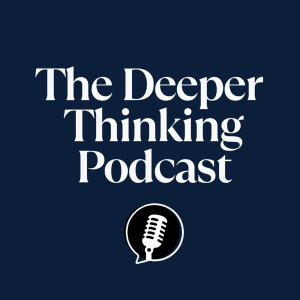
Wednesday Apr 30, 2025
Wednesday Apr 30, 2025
The Deeper Thinking Podcast draws on its creator’s 20 years of experience working internationally to improve outcomes for vulnerable communities. Episodes are informed by their lived experience and follow editorial protocols intended to ensure fidelity to sources and an ethical approach to complex ideas. Contemporary editorial methods, including a digital narrator to meet production needs, are used to support research and develop ideas while editorial judgement remains with the show’s author
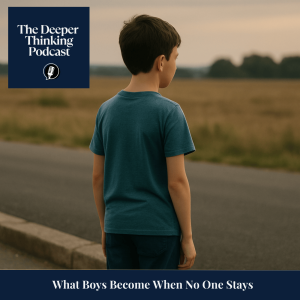
Wednesday Apr 30, 2025
Wednesday Apr 30, 2025
What Boys Become When No One Stays
The Deeper Thinking Podcast
What if the most fragile structure in a boy’s life wasn’t failure, but the absence of someone who stayed? In this episode, we explore how masculinity is shaped not through strength or ideology, but through vacancy. From silent fathers to algorithmic mimicry, from emotional suppression to disappearing mentorship, we trace how disconnection becomes a blueprint—and what it takes to unwrite it. This is not an argument. It is a quiet cartography of presence, return, and the soft work of becoming someone who stays.
With quiet references to Scott Galloway, Hannah Arendt, bell hooks, and Simone Weil, we reflect on masculinity not as an identity, but as a relational ethic—something built, moment by moment, in the presence of another who does not leave.
Why Listen?
Explore how absence—not aggression—has shaped the inner lives of boys
Reflect on masculinity as contribution, presence, and emotional inheritance
Understand the cultural collapse of mentorship—and what might restore it
Engage with ethical masculinity without ideology or spectacle
Listen On:
YouTube
Spotify
Apple Podcasts
Bibliography
Galloway, Scott. The Algebra of Happiness. New York: Portfolio, 2019.
Arendt, Hannah. The Human Condition. 2nd ed. Chicago: University of Chicago Press, 1998.
hooks, bell. The Will to Change: Men, Masculinity, and Love. New York: Atria Books, 2004.
Weil, Simone. Gravity and Grace. London: Routledge, 2002.
Perry, Grayson. The Descent of Man. London: Penguin Books, 2016.
Bibliography Relevance
Scott Galloway’s insights on mentorship and male failure quietly shaped the foundational hinge of the episode.
Hannah Arendt’s work on responsibility and natality informed the ethic of offering more than you take.
Bell Hooks’ vision of masculinity as a site of love, not domination, underpins the emotional architecture of the piece.
Simone Weil’s emphasis on attention as a moral act underlies the deeper call to witness boys differently.
Grayson Perry’s cultural critiques of masculinity’s rigidity provide a soft counterpoint to inherited norms.
#Masculinity #Boyhood #Mentorship #ScottGalloway #BellHooks #HannahArendt #SimoneWeil #EmotionalLiteracy #TheDeeperThinkingPodcast
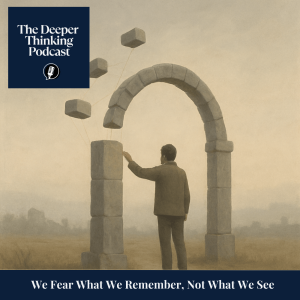
Tuesday Apr 29, 2025
Tuesday Apr 29, 2025
We Fear What We Remember, Not What We See
The Deeper Thinking Podcast
What if our greatest fears were not born from what the world presents to us, but from the memories the brain uses to predict it? In this episode, we explore a profound shift in understanding emotion, trauma, and selfhood: a move from reactivity to construction. Guided by the neuroscience of Lisa Feldman Barrett, we trace how every feeling—anxiety, sorrow, even joy—is not merely a response but a prediction, shaped from the remembered past. Trauma is reframed not as a singular event, but as a pattern of meaning that can be revised. Healing becomes not excavation, but the slow, deliberate work of building new predictions, one breath, one small act at a time.
Meaning itself, we discover, is not something discovered ready-made in the world; it is something tenderly, stubbornly, built. Agency does not arrive all at once but flickers into being through tiny acts of rechoosing—by crafting different futures from within the architectures of memory. With reflections on prediction theory, cultural inheritance, trauma, and healing, this episode offers a new way of living inside uncertainty—not as prisoners of the past, but as quiet architects of becoming.
With quiet references to Lisa Feldman Barrett, Hannah Arendt, and Simone Weil, this episode listens for the subtle architectures of choice that shape emotional life. What happens when meaning is no longer something passively absorbed but actively constructed? When suffering is not merely endured, but re-authored? When presence itself becomes a radical act of re-making what the body once predicted as inevitable?
Why Listen?
Discover how emotions are constructed through predictive processing
Reframe trauma not as event, but as a revisable pattern of memory and meaning
Learn how small acts of attention can reshape the self
Engage with philosophical reflections on agency, freedom, and emotional life
Listen On:
YouTube
Spotify
Apple Podcasts
Bibliography
Barrett, Lisa Feldman. How Emotions Are Made. New York: Houghton Mifflin Harcourt, 2017.
Arendt, Hannah. The Human Condition. 2nd ed. Introduction by Margaret Canovan. Chicago: University of Chicago Press, 1998.
Weil, Simone. Gravity and Grace. Translated by Emma Craufurd. London: Routledge, 2002.
Turkle, Sherry. Reclaiming Conversation. New York: Penguin Press, 2015.
Each referenced work supports the philosophical architecture explored in the episode, offering entry points into a deeper reflection on memory, emotion, and agency.
#LisaFeldmanBarrett #PredictiveBrain #EmotionTheory #TraumaRecovery #Agency #MeaningMaking #Selfhood #HannahArendt #SimoneWeil #TheDeeperThinkingPodcast

Monday Apr 28, 2025
Monday Apr 28, 2025
The Slow Reweaving: On Trust, Presence, and the Future of Belonging
The Deeper Thinking Podcast
What if the most urgent repairs a society needs are not material or political, but relational? This episode listens to the quiet unraveling of civic life through the twin lenses of Robert D. Putnam’s analysis of social capital and Andy Haldane’s reflections on collective economic fragility. We trace how the erosion of trust, mutual regard, and the civic imagination signals not just institutional weakness—but a crisis of relation itself.
Presence cannot be legislated back into being. It must be risked—through small, unseen acts of recognition, vulnerability, and time. This episode is not a proposal. It is a meditation on how societies slowly reweave themselves through the fibre of attention, patience, and encounter. Drawing from Hannah Arendt, Simone Weil, and Sara Ahmed, we ask how belonging can be rebuilt without spectacle—through presence, not performance.
From civic decline to ethical intimacy, we follow the subtle architecture of shared life. What emerges is not a theory, but a plea: that we return to the daily, vulnerable work of relation as the foundation of freedom itself.
Why Listen?
Understand how the erosion of social trust imperils democracy and shared life
Explore the relational foundations beneath visible political and economic structures
Reflect on how belonging is rebuilt not through design, but through daily acts of presence
Engage with thinkers like Putnam, Haldane, Arendt, Weil, and Ahmed on freedom, relation, and civic repair
Listen On:
YouTube
Spotify
Apple Podcasts
Bibliography
Putnam, Robert D. Bowling Alone: The Collapse and Revival of American Community. Simon & Schuster, 2000.
Haldane, Andy. “Counting the Cost of Bowling Alone.” RSA Lecture, 2025.
Arendt, Hannah. The Human Condition. University of Chicago Press, 1998.
Ahmed, Sara. Living a Feminist Life. Duke University Press, 2017.
Weil, Simone. Gravity and Grace. Routledge, 2002.
Bibliography Relevance
Robert D. Putnam: Frames the decline of civic participation as the erosion of shared social capital
Andy Haldane: Explores the economic costs and implications of declining social trust
Hannah Arendt: Anchors the political stakes of presence, attention, and public space
Simone Weil: Brings ethical gravity to the act of attention and the moral weight of presence
Sara Ahmed: Highlights how belonging is shaped through lived, felt, and contested experiences
What if freedom begins not with rights, but with recognition?
#SocialTrust #CivicImagination #RelationalEthics #Putnam #Haldane #Arendt #Weil #Ahmed #Presence #TheDeeperThinkingPodcast #Philosophy #Belonging #Freedom #Democracy #MutualRegard
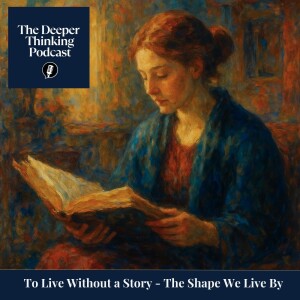
Monday Apr 28, 2025
Monday Apr 28, 2025
To Live Without a Story - The Shape We Live By
The Deeper Thinking Podcast
What if the stories we tell don’t just reflect the world—but shape how we live within it?
What if the stories we tell about ourselves don’t just reflect the world, but shape how we experience it? In this episode, we explore how narrative structures—from arcs to resolutions—don’t simply make sense of life, but create the conditions for how we understand time, meaning, and agency. We explore whether life follows a narrative, or whether we impose one retroactively to survive the chaos. From war memoirs to courtroom dramas, narrative functions as a deeply human framework—shaping not only our stories, but our very sense of self. This isn’t about storytelling for entertainment. It’s about the stories that make us human.
We draw on Paul Ricoeur and Alasdair MacIntyre, who remind us that stories are not mirrors, but scaffolding. But as narratives shape us, they also limit us. We ask whether the human mind can ever resist the pull to make sense of what might forever remain senseless. Are we able to dwell in uncertainty, or are we always narrating toward resolution?
Quiet references to Hannah Arendt, Martin Heidegger, and Simone Weil shape a deeper inquiry: does the narrative free us—or trap us? This is not an essay with answers. It’s an invitation to reflect on the shapes that hold us—and whether we are living inside a story we’ve chosen, or one we’ve inherited without question.
Reflections
Are our identities written through the stories we survive—or the ones we deny?
Can we resist the narrative impulse long enough to remain in ambiguity?
What is lost when chaos is overwritten with meaning too soon?
Do stories liberate us—or quietly script us?
How much of our freedom depends on the shape we live by?
Why Listen?
Consider how narrative shapes our experience of time, identity, and meaning
Explore the philosophical tension between coherence and chaos
Reflect on the function of storytelling in ethics, memory, and agency
Experience a contemplative approach that privileges inquiry over resolution
Listen On:
YouTube
Spotify
Apple Podcasts
Support This Work
If you'd like to support the ongoing work, you can visit buymeacoffee.com/thedeeperthinkingpodcast or leave a kind review on Apple Podcasts.
Bibliography
Arendt, Hannah. The Human Condition. 2nd ed. Introduction by Margaret Canovan. Chicago: University of Chicago Press, 1998.
Heidegger, Martin. Being and Time. Translated by John Macquarrie and Edward Robinson. New York: Harper & Row, 1962.
Weil, Simone. Gravity and Grace. Translated by Emma Craufurd. London: Routledge, 2002.
MacIntyre, Alasdair. After Virtue. 3rd ed. Notre Dame: University of Notre Dame Press, 2007.
Ricoeur, Paul. Time and Narrative, Volume 1. Translated by Kathleen McLaughlin and David Pellauer. Chicago: University of Chicago Press, 1984.
To live without a story is unbearable. To live by one unknowingly may be worse.
#NarrativePhilosophy #HumanCondition #Storytelling #Heidegger #Ricoeur #MacIntyre #SimoneWeil #HannahArendt #TheShapeWeLiveBy #TheDeeperThinkingPodcast
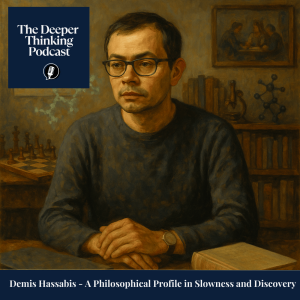
Monday Apr 28, 2025
Monday Apr 28, 2025
Demis Hassabis - The AI Pioneer.
The Deeper Thinking Podcast
What if the future of discovery demanded not just faster thinking, but slower seeing? In this episode, we explore the life and vision of Demis Hassabis—chess prodigy, neuroscientist, AI pioneer—and the deeper paradox he embodies: that true innovation may depend less on acceleration than on the careful cultivation of attention. From protein structures to mathematical proofs, from games of logic to the fragile architectures of meaning, Hassabis’s work asks us not simply what we can know, but whether we can remain human enough to hold what we uncover. This is not a celebration of technology. It is a meditation on what discovery requires: patience, discernment, and the refusal to collapse wonder into conquest.
Scientific progress, Hassabis reminds us, is not the smooth unveiling of new worlds. It is the slow art of inhabiting uncertainty—of learning to think differently long before we can act differently. As AI accelerates, it is the ancient human skills—attention, slowness, relational imagination—that will decide whether possibility becomes promise or peril. We trace how games trained his mind for complexity, how neuroscience taught him to trust emergence over control, and how philosophy now shadows the future he helped unleash. This isn’t an essay that offers solutions. It opens a space where solutions lose their urgency—and presence becomes the deeper aim.
With quiet references to Arendt, Heidegger, and Weil, this episode listens for the forms of wisdom that emerge only when discovery is slowed down. What happens when the machines we build move faster than our capacity to understand them? When meaning risks being outpaced by mastery? When the future demands a different kind of mind—one willing to linger, to doubt, and to dwell? This is not a race to the next breakthrough. It is a return to the older work: the slow making of minds still capable of wonder.
Why Listen?
Explore how AI is reshaping not only science but the ethics of discovery itself
Reflect on slowness, discernment, and the moral architecture of innovation
Engage with philosophical tensions around speed, presence, and meaning
Experience a relational, contemplative approach to technology and thought
Listen On:
YouTube
Spotify
Apple Podcasts
Bibliography
Arendt, Hannah. The Human Condition. 2nd ed. Introduction by Margaret Canovan. Chicago: University of Chicago Press, 1998.
Heidegger, Martin. Being and Time. Translated by John Macquarrie and Edward Robinson. New York: Harper & Row, 1962.
Weil, Simone. Gravity and Grace. Translated by Emma Craufurd. London: Routledge, 2002.
Sennett, Richard. The Craftsman. New Haven: Yale University Press, 2008.
Bergson, Henri. Creative Evolution. Translated by Arthur Mitchell. New York: Henry Holt, 1911.
Turkle, Sherry. Reclaiming Conversation. New York: Penguin Press, 2015.
Bibliography Relevance
Each work referenced here deepens the philosophical and ethical questions raised in this episode. They are not citations to decorate, but invitations to linger differently inside the tensions discovery now demands.
Hannah Arendt’s The Human Condition explores action, labor, and thought as fragile human practices that technological acceleration risks unmooring—a silent foundation beneath the essay’s call for slowness.
Martin Heidegger’s Being and Time frames existence not as something to master, but as something to dwell within—a philosophical current that quietly shapes the call for presence in discovery.
Simone Weil’s Gravity and Grace offers a meditation on attention and moral discernment as acts of resistance against force—echoing the essay’s concern for the ethics of attention in an era of speed.
Richard Sennett’s The Craftsman illuminates the relationship between patience, skill, and care in making—deepening the reflection on how discovery itself might be practiced differently.
Henri Bergson’s Creative Evolution reframes change as emergence rather than mere accumulation—supporting the essay’s vision of progress as something slower, stranger, and more relational than technological narratives often allow.
Sherry Turkle’s Reclaiming Conversation examines the erosion of deep presence in a connected world—offering a cultural echo to the essay’s philosophical call for reweaving attention and relationality in a technological era.
#DemisHassabis #ArtificialIntelligence #SlowThinking #EthicsOfAI #DeepMind #PresenceInProgress #HannahArendt #MartinHeidegger #ScientificDiscovery #DeeperThinkingPodcast
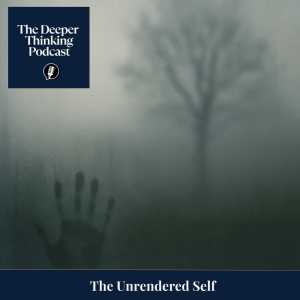
Saturday Apr 26, 2025
Saturday Apr 26, 2025
The Unrendered Self
The Deeper Thinking Podcast
What happens to the self when even absence becomes a kind of presence? In this episode, we examine the quiet erosion of identity under conditions of constant visibility. This is not about digital detox or offline escape—it’s about the deeper structural shift where reflection becomes performance, privacy becomes signal, and being becomes something that must be rendered to be real.
We explore how the self survives—or doesn’t—amid an economy of attention that cannot tolerate ambiguity. Drawing on Simone Weil’s ethics of attention, Gloria Anzaldúa’s defence of contradiction, and Roland Barthes’s concept of the neutral, the episode traces the contours of presence without performance. We also touch on Édouard Glissant’s right to opacity and Hannah Arendt’s space of appearance to imagine what it means to remain unrendered—felt but uncaptioned, real but unreadable.
This is not an elegy for privacy—it is a meditation on presence without proof. A quiet reclaiming of the unspoken, the unperformed, the unnamed self. The one who listens but does not post, who thinks but does not narrate, who exists in the opacity we are no longer taught to value.
Why Listen?
Reframe visibility and identity through the lens of attention, fatigue, and erosion
Engage with thinkers like Barthes, Glissant, Weil, and de Certeau without academic distance
Experience audio as a space of ambient intimacy and structural reflection
Consider what it means to exist without translating yourself
Listen On:
YouTube
Spotify
Apple Podcasts
Bibliography
Weil, Simone. Gravity and Grace. London: Routledge, 2002.
Glissant, Édouard. Poetics of Relation. Ann Arbor: University of Michigan Press, 1997.
Barthes, Roland. The Neutral. New York: Columbia University Press, 2005.
Arendt, Hannah. The Human Condition. Chicago: University of Chicago Press, 1998.
de Certeau, Michel. The Practice of Everyday Life. Berkeley: University of California Press, 1984.
Anzaldúa, Gloria. Borderlands/La Frontera: The New Mestiza. San Francisco: Aunt Lute Books, 1999.
Bibliography Relevance
Simone Weil: Offers a sacred attention that does not demand rendering, anchoring presence in stillness.
Édouard Glissant: Defends opacity as an ethical right, countering the demand to be always visible, always legible.
Roland Barthes: Introduces the neutral as a space of resistance to classification, performance, or capture.
Hannah Arendt: Invites reflection on how public identity emerges within a space of appearance, and what it means to disappear from it.
Michel de Certeau: Highlights the quiet subversions of everyday life—walking without mapping, speaking without broadcasting.
Gloria Anzaldúa: Centres contradiction and multiplicity as modes of authentic, unrendered being.
To be unrendered is not to vanish—but to resist conversion into content.
#AttentionEconomy #VisibilityFatigue #PhilosophyOfSelf #SimoneWeil #GloriaAnzaldúa #RolandBarthes #EdouardGlissant #HannahArendt #DeCerteau #TheDeeperThinkingPodcast #Presence #Opacity #ExistenceWithoutPerformance #AmbientIntimacy
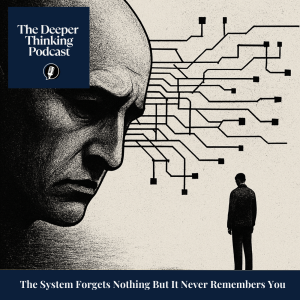
Saturday Apr 26, 2025
Saturday Apr 26, 2025
The System Forgets Nothing, But It Never Remembers You
The Deeper Thinking Podcast
A meditation on capitalism, memory, and the quiet refusal to be rendered knowable.
We live in a system that forgets nothing, but never remembers us. It tracks our movements, records our actions, and stores our data—yet the more it accumulates, the less it seems to know us. It does not recognize us as beings, but as fragments in an ever-expanding machine. In this world, alienation is not an affliction—it is the architecture.
This episode traces the silent contradiction at the heart of late capitalism—how it demands our presence while erasing our personhood. Drawing from the writings of Karl Marx, Fredric Jameson, Silvia Federici, and Bernard Stiegler, we examine how unpaid life, estranged labor, and digital extraction converge to produce not just economic inequality—but ontological displacement.
This is not a story of collapse. It is a search for interruption: moments that elude monetization, gestures that resist capture, spaces that soften rather than sort. In this episode, the act of remembering oneself—within and against the system—becomes a philosophical gesture of resistance.
Reflections
Some thoughts that surfaced in the margins:
The system doesn’t forget because it remembers—it forgets because it never knew you.
To be recognised as data is not to be remembered—it is to be rendered predictable.
Attention is political. So is memory. So is the act of feeling real in a world of proxies.
Not all gestures need to be productive. Some simply need to be felt.
Capitalism metabolises everything—except what we refuse to offer.
The smallest acts of presence might be the only unextractable currency we have left.
Why Listen?
Reframe capitalism not as an economic force—but as an ontological structure
Trace alienation as infrastructure, not just emotion
Engage with Marx, Jameson, Federici, and Stiegler on attention, memory, and unpaid life
Recognise the small, human gestures that resist extraction
Listen On:
YouTube
Spotify
Apple Podcasts
Support This Work
If you’d like to support the ongoing work, you can visit buymeacoffee.com/thedeeperthinkingpodcast or leave a review on Apple Podcasts. Thank you.
Bibliography
Marx, Karl. Economic and Philosophic Manuscripts of 1844. New York: International Publishers, 1964.
Jameson, Fredric. Postmodernism, or, The Cultural Logic of Late Capitalism. Durham: Duke University Press, 1991.
Federici, Silvia. Caliban and the Witch. New York: Autonomedia, 2004.
Stiegler, Bernard. Technics and Time, 1: The Fault of Epimetheus. Stanford: Stanford University Press, 1998.
Han, Byung-Chul. Psychopolitics. London: Verso, 2017.
Bibliography Relevance
Karl Marx: Explores alienation and the displacement of human essence under capitalism
Fredric Jameson: Frames late capitalism as a totalising cultural logic
Silvia Federici: Grounds the politics of unpaid labor in historical structures
Bernard Stiegler: Introduces technics as memory systems that displace human temporality
Byung-Chul Han: Uncovers the internalisation of control through self-optimization
To be remembered, we must first become illegible to the system that forgets nothing.
#OntologicalCapitalism #KarlMarx #FredricJameson #SilviaFederici #BernardStiegler #ByungChulHan #Memory #Alienation #Postmodernism #EstrangedLabor #CapitalismCritique #TheDeeperThinkingPodcast #SystemicForgetting
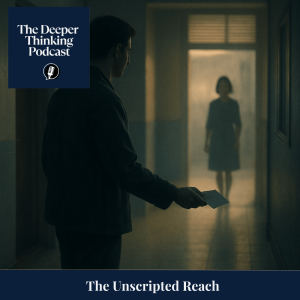
Saturday Apr 26, 2025
Saturday Apr 26, 2025
The Unscripted Reach
The Deeper Thinking Podcast
What happens when the act of reaching out becomes rarer than the connection itself? In this episode, we trace the slow disappearance of interpersonal initiation—not as a cultural lapse, but as a civilizational contradiction. Algorithms promise endless proximity, yet remove the necessity of contact. We ask what is lost when approach is replaced by performance, and what it means to risk presence in an age of optimization.
Through the lens of philosophy and lived gesture, we explore the disappearance of embodied mutuality—from Aristotle’s vision of human fulfillment in relation, to Simone Weil’s understanding of attention as generosity, and Emmanuel Levinas’s ethics of the face. We ask: how do we become, if never met? What happens to courage when friction is removed from the social field? In the absence of real-time approach, we find a loss not just of intimacy—but of ethical improvisation itself.
This is not an argument for nostalgia. It is a meditation on risk, refusal, and revelation—on the sacred awkwardness of showing up unrehearsed, and the relational art we may be forgetting how to perform.
Why Listen?
Reflect on intimacy as relational improvisation, not outcome
Understand how frictionless design impacts mutual becoming
Explore quiet allusions to Aristotle, Weil, Levinas, Badiou, and Byung-Chul Han
Reconsider the ethics of hesitation, awkwardness, and approach
Listen On:
YouTube
Spotify
Apple Podcasts
Bibliography
Agamben, Giorgio. The Coming Community. Trans. Michael Hardt. University of Minnesota Press, 1993.
Aristotle. The Politics. Trans. Benjamin Jowett. Dover Publications, 2000.
Badiou, Alain. In Praise of Love. Trans. Peter Bush. The New Press, 2012.
Baudrillard, Jean. Simulacra and Simulation. Trans. Sheila Faria Glaser. University of Michigan Press, 1994.
Buber, Martin. I and Thou. Trans. Ronald Gregor Smith. Scribner, 1970.
Byung-Chul Han. The Transparency Society. Trans. Erik Butler. Stanford University Press, 2015.
Foucault, Michel. Discipline and Punish. Trans. Alan Sheridan. Vintage Books, 1995.
Kierkegaard, Søren. The Present Age. Trans. Alexander Dru. Harper Torchbooks, 1962.
Levinas, Emmanuel. Totality and Infinity. Trans. Alphonso Lingis. Duquesne University Press, 1969.
Nietzsche, Friedrich. The Gay Science. Trans. Walter Kaufmann. Vintage Books, 1974.
Nietzsche, Friedrich. Thus Spoke Zarathustra. Trans. R.J. Hollingdale. Penguin Books, 2003.
Scarry, Elaine. The Body in Pain. Oxford University Press, 1985.
Stiegler, Bernard. Technics and Time, 1. Trans. Richard Beardsworth and George Collins. Stanford University Press, 1998.
Turkle, Sherry. Alone Together. Basic Books, 2011.
Weil, Simone. Gravity and Grace. Trans. Emma Craufurd. Routledge, 2002.
Weil, Simone. Waiting for God. Trans. Emma Craufurd. Harper Perennial Modern Classics, 2009.
Zuboff, Shoshana. The Age of Surveillance Capitalism. PublicAffairs, 2019.
When initiation disappears, contact becomes content. But what becomes of the human in the absence of risk?
#Presence #Attention #Hesitation #PhilosophyOfRelation #Buber #Weil #Levinas #Optimization #Improvisation #TheDeeperThinkingPodcast #UnscriptedReach #Friction #EthicsOfDialogue #DigitalIntimacy
```
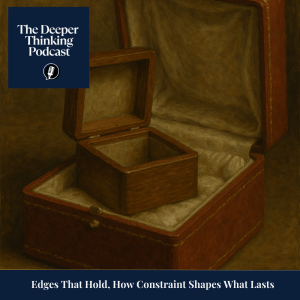
Friday Apr 25, 2025
Friday Apr 25, 2025
Edges That Hold: How Constraint Shapes What Lasts
The Deeper Thinking Podcast
What if the moments that stay with us didn’t arise from freedom, but from its absence? This episode explores how material, emotional, and structural constraint can become the shape of expression itself.
We trace this paradox through a child’s treehouse, the tape hiss in Daniel Johnston’s basement recordings, the quiet of Agnes Martin’s grids, and the undeveloped rolls left behind by Vivian Maier. These are not stories of overcoming adversity. They are devotions to the form that holds. Constraint here is not failure—it’s fidelity.
The conversation threads through Simone Weil on attention as moral act, Marshall McLuhan on form becoming message, Gaston Bachelard on poetic space, and Jean-Paul Sartre on situated freedom. From minimalist sound to photographic silence, from domestic labor to the unseen archive, this episode listens for the work that doesn’t transcend its frame—but honours it.
Why Listen?
Reframe constraint as creative condition, not limitation
Encounter artists whose work is inseparable from what they lacked
Explore the ethics of form, silence, and minimal presence
Engage thinkers from Martin to Maier, Johnston to Bachelard
Listen On:
YouTube
Spotify
Apple Podcasts
Bibliography
Bachelard, Gaston. The Poetics of Space. Boston: Beacon Press, 1994.
Maier, Vivian. Vivian Maier: Street Photographer. New York: powerHouse Books, 2011.
Martin, Agnes. Writings. Ostfildern: Hatje Cantz, 2005.
McLuhan, Marshall. Understanding Media: The Extensions of Man. Cambridge: MIT Press, 1994.
Sartre, Jean-Paul. Being and Nothingness. Translated by Hazel Barnes. New York: Washington Square Press, 1993.
Weil, Simone. Gravity and Grace. Translated by Emma Craufurd. London: Routledge, 2002.
Bibliography Relevance
Gaston Bachelard: Frames space as poetic rather than merely architectural—constraint as imaginative ground.
Simone Weil: Recasts attention as ethical form—constraint as devotion.
Marshall McLuhan: Asserts that medium is not neutral—constraint shapes content itself.
Jean-Paul Sartre: Links freedom not to choice but to situated responsibility—constraint as condition of agency.
Sometimes what lasts is not what breaks free—but what stays still, within its edges.
#Constraint #AgnesMartin #VivianMaier #DanielJohnston #Bachelard #SimoneWeil #McLuhan #Sartre #PoeticsOfSpace #CreativeLimitations #Minimalism #TheDeeperThinkingPodcast #EthicsOfForm #ArtAndSilence #PhilosophyOfConstraint









